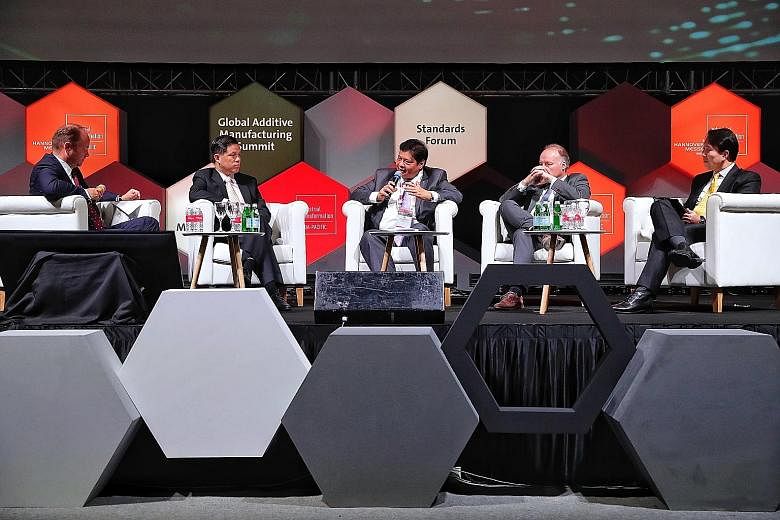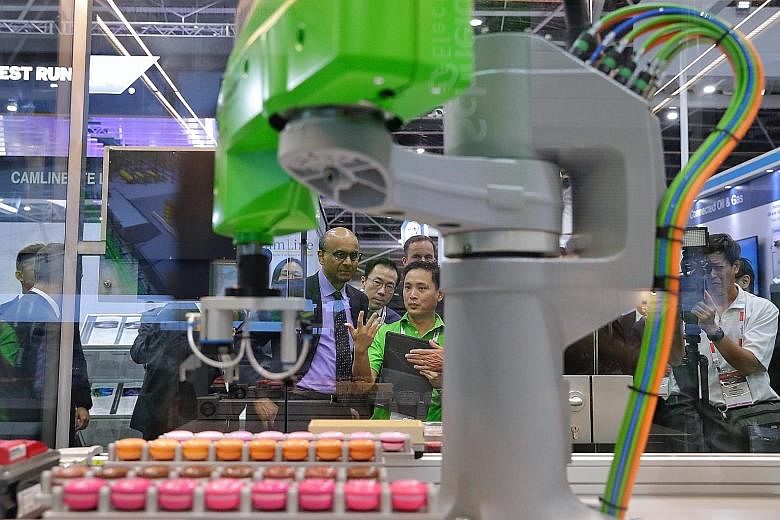How does a tiny country like Singapore compete for business against bigger countries not held to ransom by price or size constraints?
The answer, said Minister for Trade and Industry Chan Chun Sing, is by producing low-volume but high-quality and highly customised products, competing in a different space from nations that churn out mass-produced goods.
Thanks to today's technological advances, Singapore has the opportunity to transcend its land size and labour restrictions, Mr Chan said yesterday at a panel discussing the opportunities Industry 4.0 can bring to the region.
It is part of the three-day Industrial Transformation Asia-Pacific trade show at Singapore Expo ending tomorrow.
Also on the panel were Indonesia's Minister of Industry Airlangga Hartarto, ST Engineering's president and chief executive Vincent Chong and German sensor manufacturing firm Pepperl+Fuchs' chief executive Gunther Kegel.
Industry 4.0, or the Fourth Industrial Revolution, is the current era of industrial change marked by the arrival of the Internet and other smart technologies, such as robots, artificial intelligence and 3D printing, in the workplace.
Previous industrial revolutions were sparked by technological advances such as the invention of computers and the use of machines to replace manual labour in factories.
While Singapore is an advanced country and possesses an advantage over many others, Mr Chan warned that it should never be complacent.
This is because advanced countries face greater challenges in wanting to transform and are more vulnerable to disruption, he said, referencing the innovator's dilemma, a paradox made popular by prominent American businessman Clayton Christensen.
"If you don't change fast enough, other countries will overtake you with a (new) development that will adopt some of the latest technologies. And then you will find, when you look back in 20 years' time, that it may not be advanced countries that are still at the forefront," he said.
Mr Chan added that Singapore is still at a nascent stage of the transformation process, noting that many companies are stuck at a stage of only trying to mechanise and digitalise current processes, without thinking about re-engineering these processes to truly transform their businesses.
He said when many companies refer to training programmes, they refer to the training of workers instead of the middle and upper management in the company.
Dr Kegel agreed there was a need for higher management to upskill too, but added that much more sophisticated training is needed to alter mindsets at that level.
"It is a very painful exercise because moving people out of their comfort zones and forcing them to rethink what they have done professionally over the last 20-odd years is truly a challenge," he said.
Responding to a question by panel moderator Christoph Schmitz on governments' role in Industry 4.0, Mr Chan said it is to create an enabling environment for firms to innovate.
To do so, he said Singapore is writing regulations and rules that spur innovation. Mr Chan did not give any examples.
However, he said the Government also wants to work with trade associations as intermediaries with businesses because they are most aware of the needs of their industries.
On education, he said the conventional education system alone is too slow to meet the needs of tomorrow. "Our challenge is how to compress the learning cycle to meet the needs of Industry 4.0. Don't get me wrong, the traditional school system is still important for foundational skills like sciences and mathematics," he said.
Beyond classroom-based models, he suggested a peer-learning environment for workers and middle managers, in which a community of learners solves problems together.
SEE HOME



